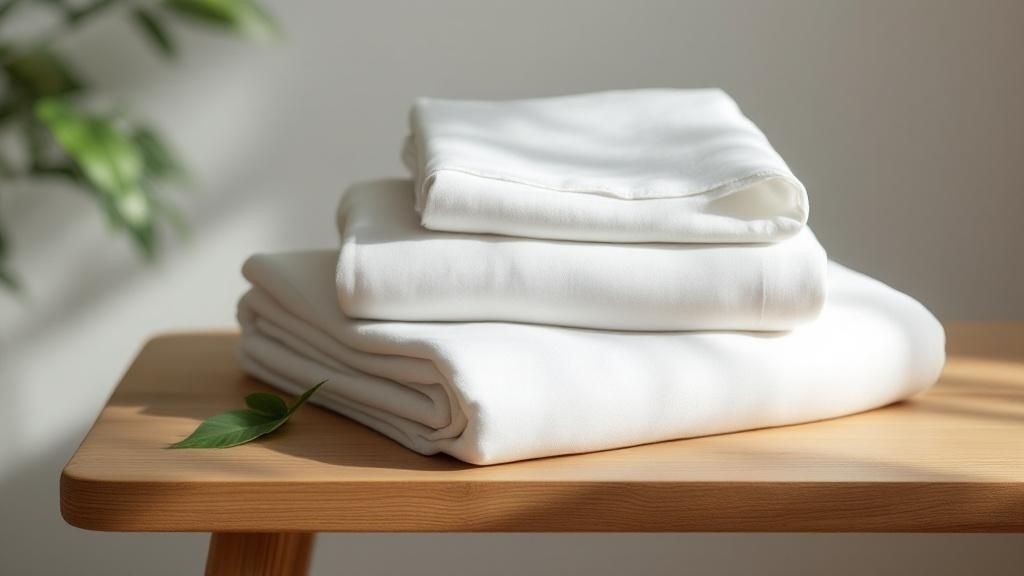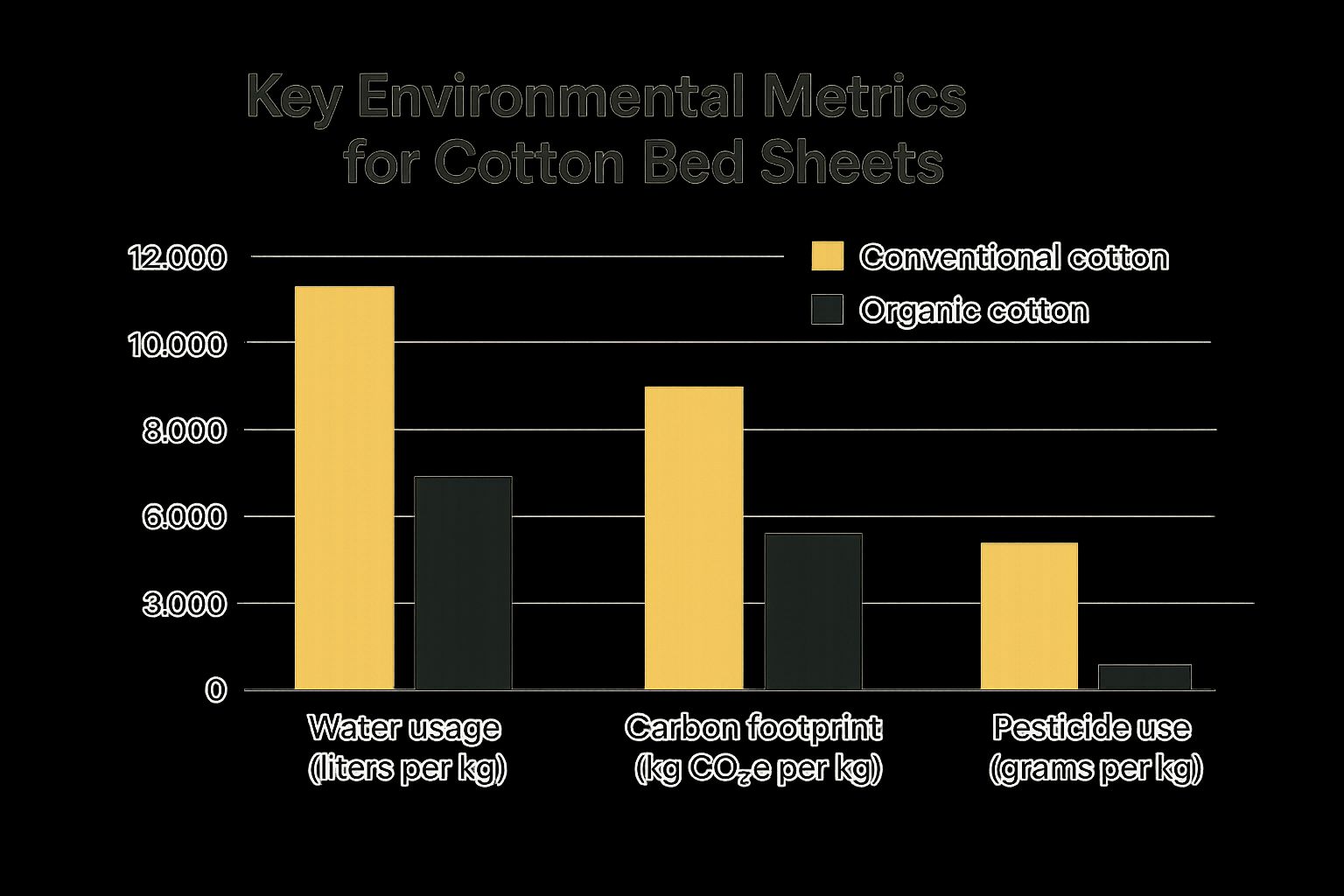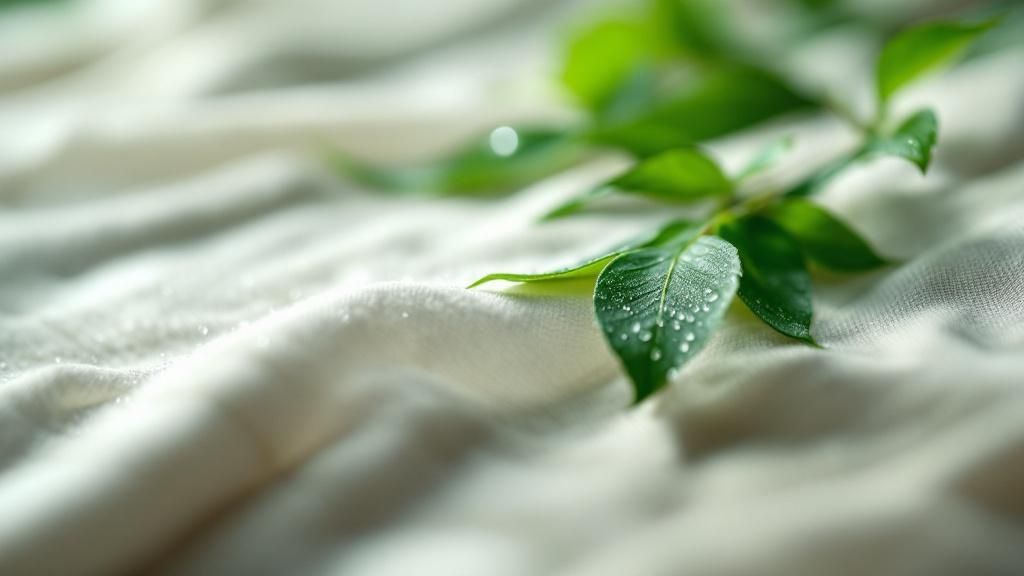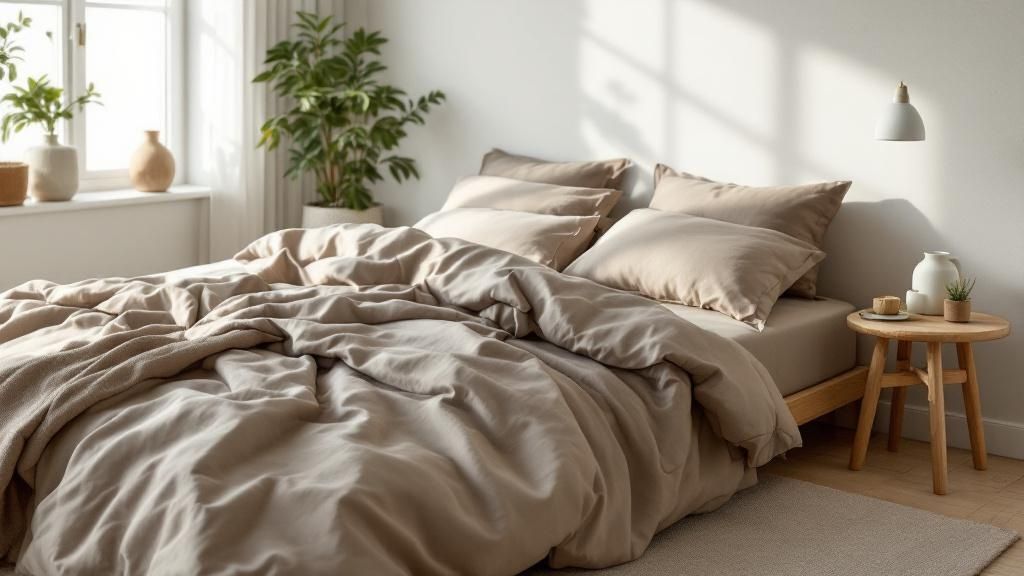Choosing environmentally friendly bed sheets isn't just a home decor decision. It's a powerful choice for your health and the planet. Considering we spend about a third of our lives in bed, the materials we sleep on every single night have a huge impact on our well-being and the environment.
Why Your Bedding Choice Matters More Than You Think

The sheets you sleep on are more than just fabric—they're a direct link between your personal sanctuary and the world outside. The reality is, conventional bedding is often produced using a cocktail of harsh chemicals, pesticides, and an enormous amount of water. This process contributes to pollution and drains our natural resources.
Switching to sustainable alternatives is one of the most direct ways you can vote for a cleaner, healthier planet. This isn't just a small trend, either; it’s a movement that's genuinely reshaping the industry. The U.S. bedsheets market, currently valued at USD 7.75 billion, is seeing major growth as more people demand eco-conscious products. This surge in consumer awareness is what's making natural and organic options so popular. You can find more market growth insights from Fortune Business Insights.
Beyond a Good Night's Sleep
The benefits of choosing environmentally friendly sheets go far beyond the ethical high ground—you can actually feel the difference. Many people don't realize that standard sheets are often treated with synthetic dyes and chemical finishes that can irritate the skin. If you have allergies, eczema, or just sensitive skin, making the switch can bring remarkable relief.
By choosing materials grown and processed without harmful chemicals, you are creating a purer, healthier sleep sanctuary. This isn’t just about feeling good ethically; it’s about tangible wellness benefits.
Ultimately, every dollar you spend sends a message. When you buy sustainable bedding, you're directly supporting:
- Smarter farming practices that preserve soil and conserve water.
- A reduction in chemical runoff that pollutes our ecosystems.
- Safer working conditions for the farmers and textile workers who make our linens.
Your bed should be a place of pure rest and renewal. Making a conscious choice about your sheets ensures that your personal space nurtures both you and the environment. It’s a simple, everyday decision that lets you rest easier in every sense of the word.
Decoding the Best Eco-Friendly Sheet Materials
Picking the right material is easily the most important part of finding your perfect eco-friendly bed sheets. It's not just about how they feel; each fabric has a completely different environmental story. Let’s walk through the most popular options so you can figure out what truly fits your sleep style and personal values.
The difference between conventional cotton and its organic cousin is pretty stark, especially when you look at the resources involved.

As you can see, simply choosing organic cotton makes a massive difference, slashing water use and getting rid of harmful pesticides entirely.
Organic Cotton: A Familiar Comfort
Think of your favorite, softest t-shirt—that's the classic comfort of organic cotton. It has a familiar, comforting feel that only gets better and softer with each wash. The real win here is that it's grown without the cocktail of toxic pesticides and synthetic fertilizers that conventional cotton relies on. This makes it a much healthier option for the farmers, the surrounding ecosystems, and your own skin.
As a natural fiber, organic cotton is breathable and holds up well over time, giving you a great mix of comfort and durability. It does use more water than some other eco-options, but it's still a huge leap forward from standard cotton.
Bamboo: Silky, Smooth, and Cooling
Bamboo sheets are famous for their incredible softness and a silky, drapey feel that feels absolutely luxurious. If you're someone who tends to sleep hot or deals with night sweats, bamboo is a game-changer.
Bamboo is naturally breathable and fantastic at wicking away moisture. It works by pulling heat and sweat away from your body, which helps you stay much cooler and more comfortable all night long.
The bamboo plant itself grows incredibly fast with little need for pesticides, making it a very sustainable crop. The crucial part is to look for bamboo viscose or lyocell produced in a closed-loop system. This ensures the manufacturing process is as green as the plant. For a deeper dive, check out why bamboo sheets are a cool and eco-friendly choice, especially for hot sleepers.
Linen and Hemp: The Rustic Powerhouses
When it comes to durability and raw sustainability, linen and hemp are tough to beat. Both plants require very little water to grow and thrive without pesticides, which gives them a remarkably small agricultural footprint.
So, what do they feel like?
- Linen: Has a wonderfully airy and breathable quality with a unique, crisp texture. It’s a fabric that softens beautifully over the years and is an absolute dream in warm climates.
- Hemp: Feels a lot like linen but has a slightly more substantial, earthy texture. It's known for being incredibly strong and is naturally resistant to mold.
Both of these fabrics offer a more relaxed, rustic look compared to the silky finish of bamboo or the smoothness of cotton. They are true investment pieces that, with the right care, can last for decades.
Eco-Friendly Bed Sheet Material Comparison
To make sense of it all, it helps to see these materials side-by-side. Each has its own unique combination of feel, benefits, and environmental credentials.
| Material | Key Benefits | Feel & Texture | Environmental Impact |
|---|---|---|---|
| Organic Cotton | Hypoallergenic, breathable, gets softer with use | Soft, crisp, and familiar, like a classic t-shirt | Low pesticide use, but higher water consumption than bamboo or linen |
| Bamboo | Exceptionally cooling, moisture-wicking, silky smooth | Silky, drapey, and incredibly soft | Fast-growing plant, requires minimal water. Look for closed-loop processing. |
| Linen | Extremely durable, highly breathable, gets softer over time | Crisp, airy, and textured with a relaxed look | Requires very little water and no pesticides; flax plant improves soil health |
| Hemp | Most durable natural fiber, naturally antimicrobial | Similar to linen but with a more substantial, earthy feel | Extremely low water needs, pest-resistant, and replenishes soil |
Ultimately, the best choice comes down to your priorities. Whether you value a cool night's sleep, a familiar soft touch, or the most ruggedly sustainable option, there's an eco-friendly fabric that's perfect for you.
How to Spot Genuinely Sustainable Bedding

With so many brands throwing around terms like "eco" and "green," it's easy to feel lost. How can you tell the difference between clever marketing and a genuine commitment to the planet? It really comes down to looking for proof.
Authentic sustainability isn't just a buzzword; it's a verifiable process that traces a product's entire journey, from the farm to the fabric in your home. When you're searching for truly sustainable sheets, your first move should be to hunt for third-party certifications on the product tags or the company’s website. These aren't just fancy logos—they're your guarantee that an independent body has audited the product for safety and sustainability.
The most reliable way to sidestep greenwashing is to trust the certifiers. A brand that invests in getting certified is showing a real commitment to transparency and ethical production.
When you're looking for genuine sustainable bedding, it's also worth seeing if the company offers other environmentally friendly and cruelty-free products, as this can signal a broader commitment.
Key Certifications to Look For
Here are the top labels I always recommend looking for. They're clear signals that you're making a truly sustainable purchase.
-
GOTS (Global Organic Textile Standard): This is the gold standard for a reason. GOTS certification guarantees the textile is made from at least 95% certified organic fibers. Crucially, it also ensures ethical labor practices are followed throughout the entire supply chain.
-
OEKO-TEX Standard 100: Seeing this label means every single component of the bedding—from the thread and buttons to the zipper—has been tested for harmful substances and found to be safe for human health.
-
Fair Trade Certified: This one is all about the people. Fair Trade focuses on ensuring the workers behind your sheets receive fair wages and work in safe, empowering conditions. It's a direct investment in farming communities.
There's a good reason for this shift. The global organic bedding market was valued at USD 531.3 million and is expected to nearly double as more of us prioritize sleeping on chemical-free materials. This is especially true for anyone with sensitive skin, since organic sheets can significantly reduce irritation.
For a deeper dive into how these standards play out with specific materials, check out our guide on how to choose the perfect bamboo sheets. As you'll see, these certifications are vital for ensuring both quality and safety. By keeping an eye out for these labels, you can sleep soundly knowing you've chosen bedding that's better for you and the planet.
Keeping Your Eco-Friendly Sheets Around for the Long Haul
So, you've made a great choice by investing in high-quality, environmentally friendly bed sheets. Now, let's make sure they last. Taking proper care of your sheets not only protects your investment but also reinforces the sustainable choice you've already made. And honestly, it’s usually easier than caring for standard bedding.
The secret really just boils down to being gentle. Natural fibers thrive with milder care routines, which—no surprise—are also much better for the planet. A great first step is to always wash your sheets in cold water on a delicate cycle. This simple change helps prevent shrinking, keeps the fabric strong, and cuts down on energy use every time you do laundry.
Smart Washing and Drying Habits
How you care for your bedding is just as important as the materials you choose. Opting for gentle, phosphate-free laundry detergents is a perfect example. These detergents are effective against dirt but won't harm the delicate fibers of your sheets, which helps reduce your overall environmental impact.
Whatever you do, steer clear of harsh chemicals. Bleach and most commercial fabric softeners are notorious for breaking down natural fibers over time, causing them to thin out and tear. They can even strip away the fabric's natural softness and moisture-wicking abilities.
Here are a few habits I've found make a huge difference:
- Hang them out to dry. Line drying is the absolute best option. It uses zero energy, and the sun acts as a natural sanitizer. Plus, it avoids the friction and heat of a machine.
- If you use a dryer, keep it low. High heat is the mortal enemy of natural fibers like organic cotton and especially bamboo. Always, always use the lowest heat setting available.
- Switch to wool dryer balls. Ditch the disposable dryer sheets. Reusable wool dryer balls soften your sheets naturally and can even shorten your drying time by up to 25%.
Different materials sometimes need slightly different care. Bamboo sheets, for instance, have their own quirks to keep them feeling incredibly soft. If you have a set, we've put together a guide where you can learn more about how to care for bamboo sheets and get the best results.
The Hidden Health Benefits of Organic Bedding

When you choose environmentally friendly bed sheets, you're doing more than just helping the planet—you're making a powerful investment in your own well-being. The simple fact is, the materials you surround yourself with for eight hours a night have a direct impact on your health. Making a conscious switch can create a healthier sleep environment for you and your family.
Think about it. Conventional bedding often comes from crops treated with pesticides and is later processed with harsh chemical dyes and synthetic finishes. These residues don't just wash away; they can linger in the fibers, potentially irritating your skin or triggering sensitivities. For anyone dealing with allergies, eczema, or even respiratory issues, this can turn your bed from a sanctuary into a source of nightly discomfort.
Breathe Easier and Sleep Healthier
This is exactly where organic and natural bedding makes a world of difference. Materials like 100% organic bamboo and cotton are grown and processed without those aggressive chemicals, making them naturally hypoallergenic and much gentler on your body. For many people, this simple change can be a total game-changer, helping to calm nighttime itching, sneezing, and other frustrating allergic reactions.
The link between chemical-free products and personal health isn't just a niche idea anymore. People are realizing that a healthier sleep environment is a fundamental part of well-being, not a luxury.
This shift in consumer thinking is clearly visible in market trends. The global organic bedding market hit USD 936.4 million in 2023 and is expected to climb as more of us actively seek out sleep solutions free from harmful substances. You can see the full report on the rise of organic bedding on Fact.MR to get a sense of this growing movement.
At the end of the day, investing in organic bedding is an act of self-care. You're not just buying sheets—you’re creating a safe space where your body can truly rest and recover, free from the hidden irritants often found in conventional textiles. It’s a meaningful way to put your health first, one peaceful night at a time.
Your Top Questions About Eco-Friendly Sheets, Answered
Deciding to switch to sustainable bedding is a great move, but it's totally normal to have a few questions before you commit. It's a thoughtful purchase, after all. Let's clear up some of the most common things people wonder about.
Are Environmentally Friendly Bed Sheets Really Worth the Price?
It's easy to get sticker shock, but looking at the initial price alone is a mistake. Think of it as a long-term investment in your sleep and your wallet.
These sheets are crafted from high-quality, durable natural fibers. From my experience, they consistently outlast their cheaper, mass-produced counterparts by years, which means you're buying new sheets far less often. You're not just paying for a "green" label; you're paying for better materials, ethical production, and a product built to last.
What Is the Real Difference Between Organic and Regular Cotton?
The difference is night and day, starting right in the field. Conventional cotton farming is notoriously harsh on the environment. It's one of the most chemically-dependent crops out there, relying on a cocktail of pesticides and synthetic fertilizers that poison soil and pollute waterways.
Organic cotton, on the other hand, is a completely different story. It’s grown using methods that actually improve soil health and conserve a ton of water. The result is a pure, clean fabric that's free from nasty chemical residues—making it a much healthier choice for your skin, the farmers, and the planet.
How Can I Tell if a Brand Is Genuinely Sustainable?
You have to learn to spot the real deal versus clever marketing. Vague terms like "green" or "natural" mean very little on their own. The best way to know for sure is to look for independent, third-party certifications. They're the gold standard.
- GOTS (Global Organic Textile Standard): This is a big one. It certifies that the fabric is at least 95% organic and that the entire production process meets strict social and environmental standards.
- OEKO-TEX Standard 100: This certification guarantees that every single part of the product—from the thread to the buttons—has been tested and found to be free of harmful substances.
- Fair Trade Certified: This seal ensures the people who made your sheets were paid fair wages and work in safe conditions. It's about human ethics, not just environmental ones.
A brand that's truly committed to sustainability will be proud to show off these certifications and will be transparent about its supply chain. If you can't find them, be skeptical.
Will Eco-Friendly Sheets Feel as Soft as Traditional Luxury Sheets?
Oh, absolutely. In many cases, they feel even softer. The idea that "luxury" comes from synthetic treatments is outdated. Today, the most luxurious feel comes from the incredible quality of the natural fibers themselves.
Fabrics like 100% organic bamboo viscose have become famous for their almost unbelievable softness. People often describe the feel as silky or buttery, with a beautiful drape that feels incredible against the skin. It’s a natural luxury, no chemical softeners needed.
Ready to feel the difference for yourself? Bamtek offers 100% organic bamboo viscose bedding that is OEKO-TEX certified, hypoallergenic, and just ridiculously soft. It’s time to upgrade to a healthier, more comfortable sleep.
Explore our collection of premium bamboo bedding at Bamtek Home










